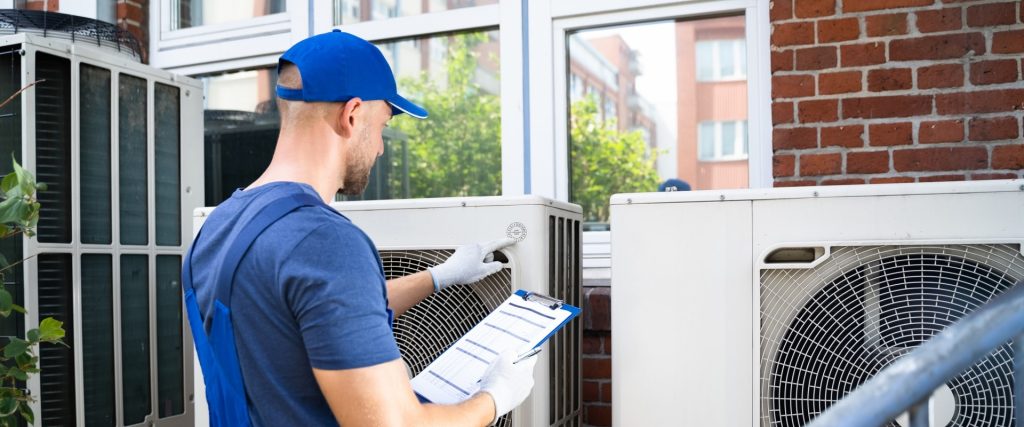
When the summer heat hits and your air conditioner decides to take an unscheduled vacation, you quickly realize just how important professional HVAC services really are. Whether you’re dealing with a complete system breakdown or just want to ensure your unit runs efficiently all season long, understanding what goes into quality air conditioning services can save you time, money, and a lot of uncomfortable nights.
Think of your HVAC system like the circulatory system of your home – when it’s working properly, you barely notice it, but when something goes wrong, everything else suffers. That’s why choosing the right mechanical HVAC professionals isn’t just about fixing immediate problems; it’s about ensuring your home’s comfort system operates reliably for years to come. Warren Mechanical HVAC is your choice for top ac repairs and installs.
Table of Contents
| Understanding Your HVAC System Basics |
| Signs Your Air Conditioning Needs Professional Attention |
| The Importance of Regular HVAC Maintenance |
| Choosing the Right HVAC Service Provider |
| Common Air Conditioning Problems and Solutions |
| Energy Efficiency and Cost Savings |
| Seasonal HVAC Preparation |
| Emergency HVAC Services: What to Expect |
| Modern HVAC Technology and Upgrades |
| Indoor Air Quality Solutions |
| HVAC Installation vs. Repair Decisions |
| Warranty and Service Agreements |
Understanding Your HVAC System Basics
Your heating, ventilation, and air conditioning system is more complex than most homeowners realize. At its core, an HVAC system consists of several key components working together: the outdoor condenser unit, indoor evaporator coil, ductwork, thermostat, and various electrical connections. Each component plays a crucial role in maintaining your home’s temperature and air quality.
The outdoor unit houses the compressor and condenser coil, which work together to release heat from your home to the outside air. Meanwhile, the indoor evaporator coil absorbs heat from inside your house, creating the cooling effect you feel. The ductwork serves as the highway system, distributing conditioned air throughout your home, while the thermostat acts as the brain, controlling when and how the system operates.
Understanding these basics helps you communicate more effectively with HVAC professionals and makes you a more informed consumer when discussing repairs or replacements.
Signs Your Air Conditioning Needs Professional Attention
How do you know when it’s time to call in the professionals? Your air conditioning system usually gives you plenty of warning signals before a complete breakdown occurs. Unusual noises are often the first red flag – grinding, squealing, or banging sounds typically indicate mechanical problems that require immediate attention.
Poor airflow is another common indicator that something’s wrong. If certain rooms aren’t cooling properly or if you notice weak air coming from your vents, you might be dealing with ductwork issues, a failing blower motor, or clogged filters. Rising energy bills without increased usage often signal that your system is working harder than it should to maintain comfortable temperatures.
Strange odors coming from your vents can indicate various problems, from mold growth in the ductwork to electrical issues. Additionally, if your system is cycling on and off frequently or struggling to maintain consistent temperatures, it’s time for professional diagnosis and repair.
The Importance of Regular HVAC Maintenance
Regular maintenance is like getting regular check-ups at the doctor – it helps catch small problems before they become expensive emergencies. Preventive maintenance typically includes cleaning or replacing air filters, checking refrigerant levels, inspecting electrical connections, and cleaning the condenser coils.
During a professional maintenance visit, technicians will examine your entire system, looking for signs of wear, potential problems, and opportunities to improve efficiency. They’ll check thermostat calibration, inspect ductwork for leaks, and ensure all safety systems are functioning properly.
The benefits of regular maintenance extend far beyond just preventing breakdowns. Well-maintained systems operate more efficiently, use less energy, and last significantly longer than neglected units. Most manufacturers require regular professional maintenance to keep warranties valid, making it both a practical and financial necessity.
Choosing the Right HVAC Service Provider
Not all HVAC companies are created equal, and choosing the right service provider can make the difference between years of reliable comfort and ongoing frustration. Licensed and insured contractors should be your starting point – these credentials protect both you and the technicians working on your property.
Look for companies with established local reputations and positive customer reviews. A company that’s been serving your community for several years is more likely to be around when you need warranty service or follow-up repairs. Transparent pricing is another crucial factor – reputable companies provide detailed estimates and explain their pricing structure upfront.
Emergency availability is particularly important for HVAC services, as system failures don’t always happen during regular business hours. Companies that offer 24/7 emergency service demonstrate their commitment to customer satisfaction and understand the urgency of comfort system failures.
Common Air Conditioning Problems and Solutions
Understanding common AC problems helps you recognize when professional intervention is necessary. Refrigerant leaks are among the most serious issues, as they not only reduce cooling efficiency but can also damage other system components. Low refrigerant levels cause the system to work harder, potentially leading to compressor failure.
Frozen evaporator coils often result from restricted airflow, usually caused by dirty filters or blocked vents. While the immediate solution might seem simple – turning off the system to let it thaw – the underlying cause requires professional attention to prevent recurrence.
Electrical problems can range from simple thermostat malfunctions to complex wiring issues. These problems are particularly dangerous for DIY attempts and should always be handled by qualified technicians. Drainage issues are also common, especially in humid climates, where clogged condensate drains can lead to water damage and system shutdowns.
Energy Efficiency and Cost Savings
Modern HVAC technology offers unprecedented opportunities for energy savings, but maximizing efficiency requires proper installation, maintenance, and operation. High-efficiency systems with SEER ratings of 16 or higher can significantly reduce energy consumption compared to older units, though the upfront investment is typically higher.
Smart thermostats represent one of the most cost-effective efficiency upgrades available. These devices learn your schedule and preferences, automatically adjusting temperatures to minimize energy waste while maintaining comfort. Many utility companies offer rebates for smart thermostat installations, further improving the return on investment.
Proper insulation and air sealing work hand-in-hand with efficient HVAC equipment. Even the most efficient air conditioner will struggle to maintain comfortable temperatures in a poorly insulated home, leading to higher energy bills and unnecessary wear on equipment.
Seasonal HVAC Preparation
Preparing your HVAC system for seasonal changes helps prevent problems and ensures optimal performance when you need it most. Spring preparation should focus on transitioning from heating to cooling mode, including changing filters, cleaning the outdoor unit, and testing the air conditioning system before hot weather arrives.
Summer maintenance involves keeping the outdoor unit clear of debris, monitoring system performance, and addressing any issues promptly to avoid peak-season breakdowns. Fall preparation includes switching back to heating mode, inspecting the furnace or heat pump, and ensuring proper airflow throughout the system.
Winter considerations vary by climate but generally include protecting outdoor units from severe weather and ensuring proper ventilation for fuel-burning heating equipment. Year-round attention to these details helps maximize system lifespan and performance.
Emergency HVAC Services: What to Expect
HVAC emergencies never happen at convenient times, which is why understanding emergency service procedures can reduce stress and costs. True emergencies typically involve complete system failures during extreme weather, gas leaks, electrical problems, or situations that pose safety risks.
Emergency service calls usually carry premium pricing due to after-hours labor costs and the urgent nature of the work. However, reputable companies are transparent about emergency rates and focus on getting your system operational safely and efficiently.
Temporary solutions might be implemented during emergency calls, with more comprehensive repairs scheduled for regular business hours. This approach helps restore comfort quickly while managing costs and ensuring thorough problem resolution.
Modern HVAC Technology and Upgrades
The HVAC industry continues to evolve, with new technologies offering improved comfort, efficiency, and convenience. Variable-speed systems adjust their output to match actual cooling or heating needs, providing better temperature control and significant energy savings compared to traditional single-speed units.
Zoned systems allow different areas of your home to be heated or cooled independently, reducing energy waste and improving comfort in homes with varying usage patterns. Heat pumps offer efficient heating and cooling in moderate climates, while geothermal systems provide exceptional efficiency by utilizing stable ground temperatures.
Smart home integration is becoming increasingly popular, allowing HVAC systems to communicate with other home automation devices for optimized energy management and convenience.
Indoor Air Quality Solutions
Modern homes are more airtight than ever, which improves energy efficiency but can lead to indoor air quality concerns. Air filtration systems range from basic filters that capture large particles to advanced HEPA systems that remove microscopic contaminants, allergens, and even some viruses.
Humidity control is crucial for comfort and health, with whole-house humidifiers adding moisture during dry winter months and dehumidifiers removing excess moisture that can lead to mold growth and comfort problems.
UV air purification systems installed in ductwork can neutralize bacteria, viruses, and mold spores, while ventilation systems help bring fresh outdoor air into your home while exhausting stale indoor air.
HVAC Installation vs. Repair Decisions
Deciding whether to repair or replace HVAC equipment involves considering multiple factors beyond simple repair costs. Age of equipment is a primary consideration – systems over 10-15 years old may be approaching the end of their useful life, making replacement more economical than major repairs.
Repair frequency and costs should be evaluated over time. If you’re calling for service multiple times per year or facing repair bills that approach 50% of replacement costs, new equipment likely makes financial sense.
Energy efficiency improvements from new equipment can offset replacement costs over time, especially when replacing very old or inefficient systems. Financing options and manufacturer rebates can make replacement more affordable than many homeowners expect.
Warranty and Service Agreements
Understanding warranty coverage and service agreement options helps protect your HVAC investment and budget for ongoing maintenance costs. Manufacturer warranties typically cover parts for specific periods, while labor warranties from installation companies cover the workmanship.
Extended warranties and service agreements can provide peace of mind and budget predictability, though it’s important to understand exactly what’s covered and what’s excluded. Annual maintenance agreements often include priority service, discounted repairs, and regular tune-ups that help prevent problems.
Reading warranty terms carefully and maintaining required service records helps ensure coverage when you need it most. Some warranties require professional installation and regular maintenance to remain valid.
Conclusion
Professional HVAC services are essential for maintaining comfortable, efficient, and safe indoor environments. From understanding your system’s basic operation to recognizing when professional intervention is necessary, informed homeowners are better equipped to make smart decisions about their comfort systems.
Regular maintenance, prompt attention to problems, and working with qualified professionals help ensure your HVAC system provides reliable service for years to come. Whether you’re dealing with emergency repairs or planning system upgrades, the investment in quality HVAC services pays dividends in comfort, efficiency, and peace of mind.
Frequently Asked Questions
How often should I have my HVAC system professionally serviced? Most HVAC systems should be professionally serviced at least once per year, with many experts recommending twice-yearly service – once before the cooling season and once before the heating season. This regular maintenance helps prevent problems, maintains efficiency, and keeps warranties valid.
What should I do if my air conditioner stops working completely? First, check your thermostat settings and circuit breakers to rule out simple issues. If these don’t resolve the problem, turn off the system and call a professional HVAC technician. Avoid attempting complex repairs yourself, as this can be dangerous and may void warranties.
How can I tell if my HVAC system is the right size for my home? Signs of improper sizing include short cycling (frequent on/off operation), uneven temperatures throughout your home, high humidity levels, or unusually high energy bills. A professional load calculation considers your home’s size, insulation, windows, and other factors to determine proper system sizing.
When is it more cost-effective to replace rather than repair my HVAC system? Generally, if repair costs exceed 50% of replacement cost, or if your system is over 10-15 years old and requiring frequent repairs, replacement is usually more economical. Additionally, very old systems may use obsolete refrigerants or have poor energy efficiency, making replacement beneficial.What can I do between professional service visits to maintain my HVAC system? Change air filters regularly (typically every 1-3 months), keep outdoor units clear of debris and vegetation, ensure vents aren’t blocked by furniture, and monitor system performance for unusual noises or performance changes. However, most maintenance tasks require professional expertise and should not be attempted by homeowners.






More Stories
HVAC Repair San Antonio: Common Issues and How to Prevent Costly Breakdowns
Signs Your Air Conditioner Is Struggling – And What You Can Do About It
Tampa Air Conditioning Company: Ensuring Comfort in the Florida Heat